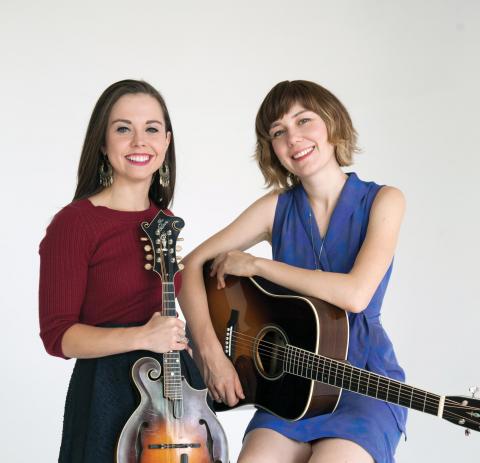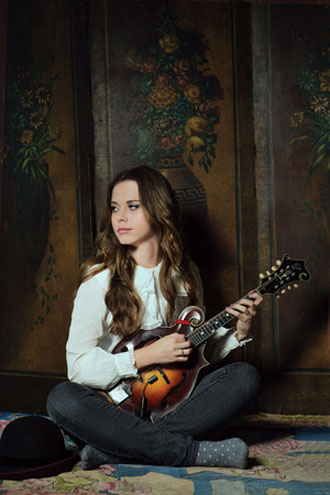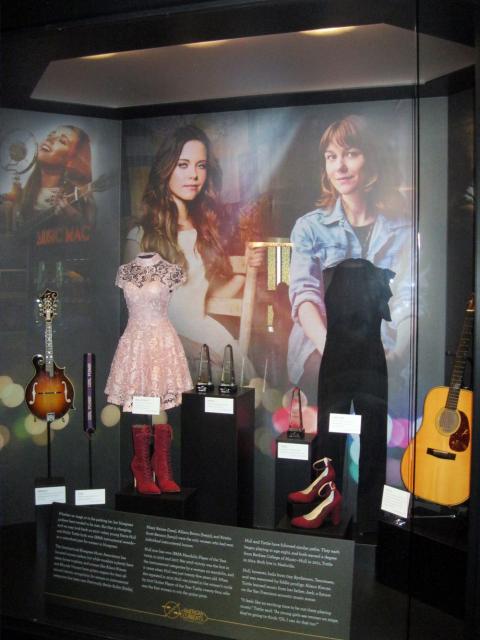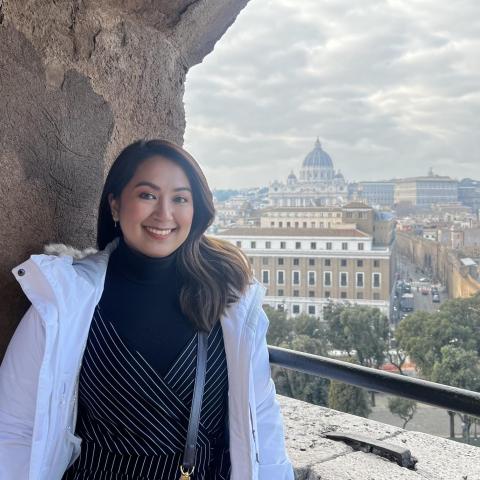Young Bluegrass Virtuosos


Molly Tuttle

Sierra Hull

Nashville’s Country Music Hall of Fame and Museum created an exhibit celebrating Sierra Hull and Molly Tuttle both winning instrumentalist of the year awards in 2017 from the International Bluegrass Music Association. Hull was the first woman ever to win the award on mandolin in 2016 at 25. Tuttle was the first woman to win on guitar in 2017 at 24. Hull went to the winners circle again with Tuttle in 2017.
Tuttle played again later in the afternoon (after the sun emerged) with her own band featuring bass (Max Johnson), banjo (Wes Corbett), and fiddle (Tatiana Hargreaves). Her setlist included her original songs as well as a few of her trademark uptempo, barn-burning covers. She cut loose on the guitar to the delight of the crowd on “White Freightliner Blues” and “Gentle on My Mind.” The latter can be found in several live YouTube videos, each averaging around 200,000 views.
Mandolinist Sierra Hull ’11 took the stage the following night with her own band. Her set showcased her soprano voice in her somewhat introspective songs with remarkably intricate mandolin parts. Her band also included bassist Ethan Jodziewicz, electric guitarist Mike Seal, and fiddler Christian Sedelmyer. The material, instrumentation, and the way each player fit into the musical mosaic departed from the more traditional sounds at the festival. But she had the audience from the first notes. Hull later made a cameo appearance on two songs in a tribute to songwriter John Hartford. In bluegrass fashion, all soloists stepped up to the mic for their solo. Hull’s lightning-fast fretwork drew enthusiastic applause and hoots from the crowd.
Tuttle and Hull have long been known in bluegrass circles for their awe-inspiring virtuosity. Each was a child prodigy playing at festivals since grade school. Both received support from their families. Molly’s father Jack Tuttle, a teacher at Gryphon Stringed Instruments in their hometown of Palo Alto, CA, schooled Molly and her brothers Sullivan and Michael in bluegrass repertoire and technique. All three became virtuosos. For years Jack, a multi-instrumentalist, led the family band (The Tuttles) at festivals and on the NPR radio show A Prairie Home Companion among other appearances.
Hull grew up in tiny Byrdstown, TN, 120 miles northeast of Nashville. Her father, Stacy Hull, became interested in playing the mandolin as an adult, and shared what he learned with young Sierra and took her with him to picking parties and jam sessions. He later drove her to weekly lessons with a mandolinist who had played with bluegrass artist Larry Sparks. Sierra’s prodigious talent was immediately apparent. Alison Krauss invited Hull to sit in with her band at the Grand Ole Opry when she was only 11. Krauss remains a mentor and friend and sang at Hull’s 2017 wedding.
Tuttle and Hull have won prestigious awards for their playing as well as songwriting. Both were named player of the year on their instruments by the International Bluegrass Music Association (IBMA). They perform together with the group First Ladies of Bluegrass that includes bassist Missy Raines, banjoist Alison Brown, and fiddler Becky Buller. Each member was the first woman to be named IBMA’s player of the year on their respective instruments. Hull was honored with a proclamation from the Tennessee House of Representatives in March, and her Weighted Mind album received a Grammy nomination for Best Folk Album for 2017. In addition to her IBMA award, Tuttle was honored in February with a Whippoorwill Arts/FreshGrass Artist Award, a grant of $25,000, and her song “You Didn’t Call My Name” was named song of the year at the International Folk Music Awards. Fittingly, Hull and Tuttle are featured together in a 2018 Country Music Hall of Fame and Museum exhibit.
Hull and Tuttle are members of a highly visible wave of accomplished women musicians rightfully receiving accolades as they share their talent with the world. If there ever was a glass ceiling in bluegrass, it’s now shattered.
Did you two meet at Berklee?
Molly Tuttle: Actually, we met when we were really young on a Kids on Bluegrass program at the International Bluegrass Music Association. I was 11 or 12 and she’s a year or two older than me. After that, I would see her at other bluegrass events. I remember thinking how amazing her playing was when she was 12 or 13. I was inspired by that and it made me want to practice really hard. She was at Berklee a little before I got there. Now that we both live in Nashville we see each other a lot.
What approach did you take to learning your instruments that enabled you to advance so quickly when you were so young?
MT: I just started by learning songs, licks, and jamming. I went to a lot of jams with my dad and to festivals like the Father’s Day Bluegrass Festival put on by the California Bluegrass Association. I learned a lot of repertoire that way. I worked hard on my cross-picking as a teenager. By playing the same tunes over and over and coming up with little variations I learned to improvise. Sometimes I would work out solos and that would help me build up ideas.
Sierra Hull: I started by learning fiddle tunes. Bluegrass is a wonderful music for building a foundation on your instrument through the traditional music that everybody knows, like “Red Haired Boy,” “Salt Creek,” or “Old Joe Clark.” There are hundreds of tunes that bluegrass musicians know no matter where they grew up. Learning to play this way is a very organic process. You end up playing the songs over and over and go to festivals and jam with people who may show you a tune you didn’t know. I also learned a lot by sitting down with CDs by mandolin players and learning their original songs and the others they played.
What prompted you to enroll at Berklee?
MT: When I was in high school and starting to think about college, I was getting into music more and more. Every weekend I was doing shows. English was one of my favorite subjects in school, so I became really interested in songwriting. Gradually I decided I wanted to pursue performing and wanted to learn as much as I could about music. I had gone to a camp in Mount Shasta in California and met a bunch of Berklee students there and we talked about the school. Of all the music schools I looked at, Berklee seemed to offer more styles than the others and had the amazing American Roots program. It seemed to me that going there would expand the way I thought about music and open my ears to other styles.
SH: I didn’t know much about Berklee growing up. When I was in high school, I got a Myspace message from John McGann, who was later my mandolin teacher at Berklee. He had seen a YouTube video of me and wrote, “If you are considering music school we’d love for you to think about coming to Berklee.” I’d already had opportunities to make a record and tour early on and doing that for a living was my dream. I always tried to be a great student in school, but I couldn’t wait to be done and get on with what I’d wanted to do since I was eight years old. So the thought of going to music school meant putting those things off for four years. At first I thought I’d wouldn’t go to Berklee.
Alison Krauss has been my biggest hero since I was a child and has been a mentor to me for many years. I told her I’d gotten a message from someone at Berklee and she said it was a great school and encouraged me to visit and check it out. When I got there, I thought it was really cool. I was told about the presidential scholarship that covered tuition, room, and board, but thought there was no way I’d get that. I told myself that if by some crazy chance I got the presidential scholarship, I couldn’t turn it down. I got a letter offering me something different, a full-tuition scholarship that I would be allowed to defer for a year. I thought I’d defer because I had tour dates already booked with the Dixie Bee-Liners and the band Uncle Earl. The day that I decided I’d call back to defer, I got a phone message to call Berklee. When I called they told me that I’d just been awarded the presidential scholarship and I couldn’t defer it. I would be the first bluegrass musician to get this award. I couldn’t say no to that!
Were there courses or faculty members who were particularly influential on you?
MT: I studied guitar with Dave Tronzo and he was really amazing. He opened my mind to the possibilities on the fingerboard. I also took private lessons with Abigail Zocher and was in her Joni Mitchell class. Kevin Barry was great too. All of the things I had to learn about triads and scales for the proficiency tests were great. I took a lot of songwriting classes as well. Mark Simos and Pat Pattison taught me a lot about writing songs.
SH: After my first semester I was on track to do four years, but I’d missed a lot because of the tours. Matt Glaser [artistic director of the Center for American Roots Music] advised me to do the two-year professional diploma. In the long run that made more sense for me because of the opportunities coming my way. Matt, Melissa Howe [chair of the string department at the time], and I would meet and discuss the best courses for me to take during those two years. This approach enabled me to take voice lessons even though mandolin was my principal instrument. I took things like a songwriting class with Mark Simos, a business class with John Kellogg, an MP&E class with Stephen Webber. I joined Eugene Friesen’s Berklee World Strings because I’d never gotten to play in an orchestra. So I had a really broad experience with things I was interested in.
Sierra, your early albums are pretty much straight bluegrass. Can you describe the genesis of your recording work?
SH: I signed a contract with Rounder Records when I was 13, but didn’t start working on a record until two years later. Alison suggested that I work with Ron Block, a member of her band. He was actually the person who originally told her about me before she called me out of the blue to come and play with her at the Grand Ole Opry when I was 11. She was too busy to produce my first record, but she gave a lot of input and helped me find the songs. I worked with Ron and members of Alison’s band on that one. On the second album I got to work with some of my other heroes.
Molly, your first recording as a solo artist was the EP Rise in 2017, which was rereleased on Compass Records. Can you talk about your next Compass album?
MT: It’s recorded, mixed, and mastered. We are working to get all of the other pieces put together before we release it in 2019. Some of the songs on it are similar to the more contemporary ones on Rise—like “You Didn’t Call My Name.” There’s hardly any bluegrass instrumentation. Sierra played on a couple of songs. So the album will be more Americana and indie sounding, but there is some bluegrass influence on it.
Are you thinking about how you’ll harmonize the reputation you’ve established in bluegrass with the music you are writing, which is a bit different?
MT: I want to try to integrate both styles by incorporating interesting guitar parts. Sometimes a song will start out as a guitar part and then I will write lyrics. Other times I will just be strumming as I make up a song and I will go back later to figure out an interesting guitar accompaniment. So there is a lot of interesting guitar playing on the new album, but the focus is the songwriting.
Sierra, for your Weighed Mind album in 2016, you self-produced some tracks and then decided to start over. Could you talk about that?
SH: I went into the studio and recorded six tracks—some with drums. I was hardly playing any mandolin, I kind of produced myself out of it because I liked what everyone else was playing so much. I worked with great musicians and engineers and the tracks sounded good. We did “Weighted Mind,” “Compass,” “Wings of the Dawn,” “I’ll Be Fine,” and others that I ended up redoing. I self-produced it because I couldn’t think of the magical person to work with. At the time, my label and management were encouraging, but they were also questioning me and wanting to hear what I was doing. Sometimes there can be too many cooks in the kitchen. You want to protect yourself. I felt so vulnerable writing music that wasn’t bluegrass and I wasn’t a good judge of my own work.
Was the label concerned because you’d done so well in bluegrass and that your own songs were going in a different direction?
SH: I wasn’t playing as much mandolin and some of the songs were a bit moody. I talked to Alison and told her I didn’t know if I loved or hated what I was working on, but I felt a pull to do it. This was not going to be a “Sierra shreds mandolin” record, and I didn’t want to be the producer. Alison suggested Béla Fleck as a producer. She said that there’s nothing musically that he doesn’t understand and that he’d be a great vocal producer. I’ve been a huge Béla fan since I was a kid. I’d played with him a time or two at festivals and connected with him when he came to Berklee while I was a student. Two months later, I ran into Béla and his wife, Abigail [Washburn] at an IBMA awards show. I told him I’d been wanting to get in touch about my project and play him some of the songs. The next day, I went to his house and played some of what we’d recorded. He said he missed really hearing me in those tracks.
Then he asked me to just sing the songs accompanying myself on the mandolin. He felt that was more interesting because he was hearing me in a way that people hadn’t heard me before. That was a lightbulb moment for me. I feel forever changed by hearing someone say, “Maybe just you is enough.” I hadn’t looked at myself that way, I’ve always played with other musicians. This made me approach my instrument differently and I started rethinking those songs.
Are there more women today who are really interested in becoming virtuosic on their instruments, and do you think there are more opportunities for women?
SH: There were women out there doing this before, but today, there are more than ever. I meet little girls who come up to me at festivals and tell me they are learning the mandolin or the fiddle and they’re excited about it. Alison was always a hero to me because she was an awesome fiddle player and singer. When I was growing up, all of my mandolin heroes were men. But I remember seeing an album by Rhonda Vincent in a store when I was about nine and thinking, “Whoa, it’s a woman holding a mandolin!” I thought, “Maybe that will be me someday.” It was rare to see that back then, but now all these young gals like Molly, Sarah Jarosz, Sarah Watkins, and Aoife O’Donovan are coming out to play. They are really inspiring a lot of people. A shift is happening and more women are realizing that they can be part of things and play as well as anybody. Maybe more guys were interested in playing before, but now a lot of young females are interested.
MT: I am excited for the generation of girls coming up. I meet a lot who are younger than me and really working on their instruments. Having more women out there doing this will inspire others. That’s how it was for me. I think it will keep growing. When I was at Berklee, I didn’t have women in any of my guitar classes. But I think there will be a lot more women playing guitar. I hope to inspire young girls to play.
Can each of you see down the road to where your career will reflect a balance between being an instrumental virtuoso and a songwriter sharing her inner feelings with the audience?
SH: As I get older, I realize that if someone had told me I’d make a record like Weighted Mind, I would have said, “What? Make an album with just mandolin and bass?” This year I’ve taken on tour ensembles with electric guitar or saxophone, piano, and different configurations to play with me. I want to stay inspired and find new ways to hear the music I’m making. I wouldn’t have foreseen this a few years ago. I’ve learned now that I have no idea what I’m going to be doing in the future.
MT: What I love the most is writing songs and recording, and of course I love performing. I’m just going to keep doing what I’m doing in different combinations. Nashville is an exciting place to be because there are so many people to collaborate with here. I also like playing on other people’s albums. I really like teaching too. I hope to incorporate more of that, whether it is teaching online or giving group and private lessons.
SH: The people who inspire me the most are those like Béla Fleck and Chris Thile. Béla is a good example of someone who took the banjo and did so much with it in many different genres. Chris Thile has done that with the mandolin. They’re not just traditional musicians; they have a lot of different projects going on. Béla is someone who is always searching for inspiration, something new.
The longer I do this, the more I see that as my ultimate aspiration. I want to do a lot of collaborative things. I used to think that I had to have an ensemble with banjo, fiddle, bass, and guitar because that’s the instrumentation you need to play traditional bluegrass. Instead, I’ve been telling myself that I want to find the musicians who inspire me no matter what instruments they play. That will be my compass for where I land next. I feel that the Weighted Mind album helped me to be seen in a different light. I don’t think whatever I do next will be terribly surprising [to my followers]. I think people will be able to accept me as just a musician rather than a particular type of musician. We’ll see where the wind blows.



